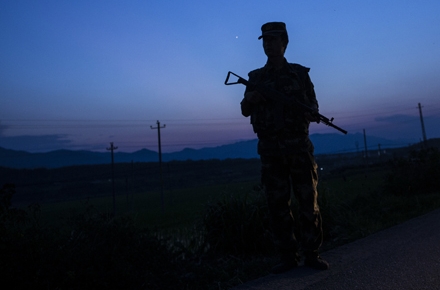Boom times and boom gates
On Myanmar’s borders with China everything is for sale – including people, reports OLIVIA CABLE.
Muse hosts one of Myanmar’s handful of official border crossings with China.
The town is located on the northern edge of Shan State, one of seven states in Myanmar, known mostly for its narcotics trade, controversial gas pipeline— from Myanmar’s Kyauk Phyu to China’s Kunming—and problematic human rights situation.
Muse’s streets throng with shops full of cheap Chinese manufactured wares, including satellite dishes, sweet cakes and balloons. With its hustlers and hawkers, its street-stalls, food-carts, red-light district and thriving black markets, Muse seems almost to crackle and pop with economic activity.
The view from the main border gate at Muse towards its neighbouring cities in China—Jaegao and Ruili—presents a jarring contrast. Peering through the border gates China looks orderly and sterile, if not by Western standards then at least in comparison to the raffish, organised chaos of Muse.
The streets are lined with manicured trees and pristine, untrammeled footpaths. Glassy high-rises dominate the streetscape, broken up only by glassy shopping malls, hotels, restaurants, gaming rooms and more.
According to a Myanmar immigration officer—who’s crisp, white uniform could lead you to think he’d just stepped off a navy ship—the border crossing at Muse is the busiest he has patrolled. Indeed, the border is heavily patrolled by armed Chinese officers, and foreigners’ access into China is heavily restricted.
While official border crossings discourage illicit activities, they also create economic opportunities for industrious vendors. Just a five-minute walk east of the official crossing, Burmese traders tap into China’s voracious consumer market. They’re selling goods through the border fence. And for these small vendors, business is booming. Middle-aged Chinese men stroll casually along the fence line, buying cartons of cigarettes to smoke or on-sell.
But it’s not all one-way traffic, and more often than not, pieces of Myanmar can be seen in China.
One hundred metres further along, the true arbitrariness of the border becomes abundantly clear. There, a gaping hole has been cut from the iron-bar fence, and it’s large enough for an average size person to squeeze through in seconds.
Two women, both under the age of 30, wait eagerly for their moment to cross. They seem well practiced, and they know what to look out for. Two Chinese patrols pass—one armed and quite serious-looking, another seemingly less concerned with border-control than upholding its impressive fitness regime.
The two women run for the fence, scampering through the hole and making a B-line for the motorcycles that await on the other side. Cargo on board, the drivers rev their two-stroke engines, kick up a small cloud of dust and disappear noisily along the street.
Human trafficking is big business in this area. Whether the two border-jumping women were somehow involved in that business is unclear, though not unlikely.
Crossing illegally into China is typical right along the border, where job seekers from Myanmar search for ways to benefit from China’s burgeoning economy. Workers from Myanmar, mostly in construction, hospitality and the domestic sectors, can receive up to three times as much income as they could earn at home.
Although Chinese authorities have previously cracked down in migrant workers from Myanmar, new development and infrastructure projects are underway.
These projects will bring employment opportunities to Muse, so migrant workers won’t be effected by China’s unfavourable policies. Local construction companies extol the virtues of a 288-acre Special Economic Zone (SEZ), which, according to the advertisements, promises a “new life, new gate, new city”. Muse’s fortuitous location bodes well for a steady increase in the volume of trade. The SEZ should reinforce the trend.
That’s good-news for the people of Muse. In the broader context of Myanmar’s changing political landscape, however, it’s only a small step.
And it’s important for Naypyitaw to continue moving forward to provide economic opportunities for its people in their own land.
Olivia Cable is a research assistant at the ANU College of Asia and the Pacific and a graduate of the College's Master of International Affairs. She is currently in Myanmar undertaking fieldwork.







